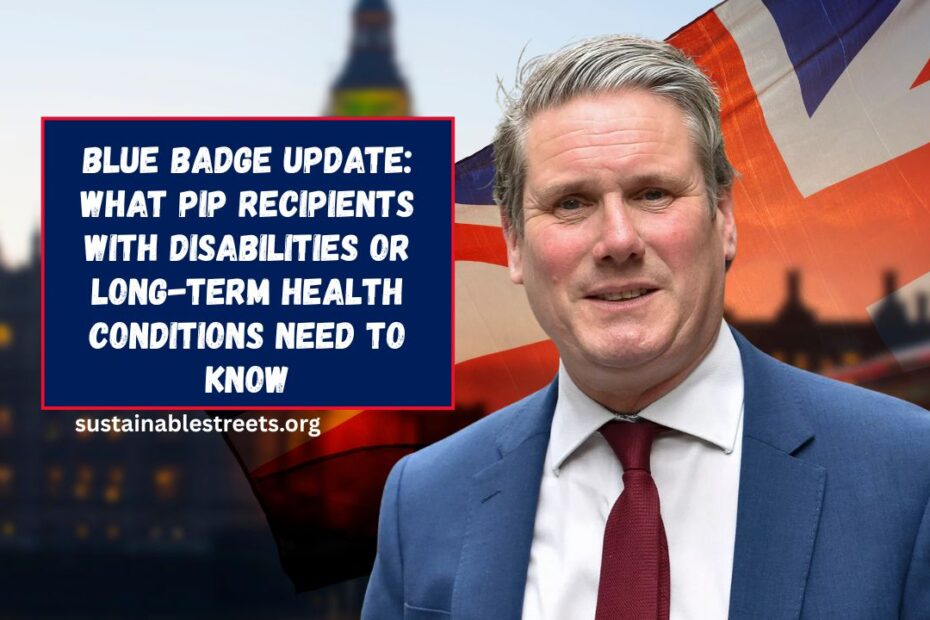The UK Government has recently come under pressure to adjust the Blue Badge scheme for individuals on Personal Independence Payment (PIP). Liberal Democrat MP Marie Goldman proposed that claimants who hold an indefinite mobility award under PIP should automatically be issued a Blue Badge for the same period.
Currently, an indefinite award, also known as a “light-touch” review, usually lasts 10 years, while local councils issue Blue Badges for a maximum of three years.
Why Blue Badge Reviews Happen Every 3 Years
In response to these calls, Lilian Greenwood, Roads Minister at the Department for Transport, clarified that the three-year cycle allows local authorities to confirm that applicants still meet eligibility criteria. She added that this timeframe ensures badge details remain accurate and legible, while also allowing councils to keep up-to-date records.
Local councils can sometimes waive reassessments if a disability is unlikely to change. Once a person’s information is on the system, renewals are generally quicker and less complicated.
How Long Applications Take
A new application or renewal for a Blue Badge can take up to 12 weeks, though most are processed in around 10 working days once submitted online. Delays may occur due to:
- Missing or late payment (£10 in England, £20 in Scotland, free in Wales).
- Requests for further supporting evidence.
- Mobility assessments where necessary.
After the first approval, future renewals are faster because the information is already stored on the system.
Blue Badge Eligibility Overview
People with physical disabilities, mobility issues, or hidden conditions such as autism, dementia, or Parkinson’s disease may qualify for a Blue Badge. It allows them to park closer to essential services and use disabled bays free of charge.
At present, there are over 3.2 million Blue Badge holders across the UK, including nearly 272,000 in Scotland. Automatic qualification often applies to those receiving higher rates of mobility-related benefits, such as:
- PIP (with 8 points in ‘moving around’ or 12 in ‘planning and following a journey’).
- Disability Living Allowance (DLA) higher mobility rate.
- Adult Disability Payment (ADP) and Child Disability Payment (CDP) mobility awards.
- War Pensioners’ Mobility Supplement or relevant Armed Forces Compensation Scheme payments.
Additional Circumstances for Qualification
Even if you don’t qualify automatically, you may still be eligible if you:
- Cannot walk at all, or are virtually unable to walk.
- Struggle to use parking meters due to severe arm disabilities.
- Care for a child under 3 needing frequent vehicle access or bulky medical equipment.
- Have a mental health condition that limits awareness of traffic danger.
Where Blue Badges Can Be Used
A Blue Badge lets holders park for free at:
- On-street parking meters.
- Pay-and-display bays.
- Disabled spaces.
- Single/double yellow lines (unless loading restrictions apply).
Badges are also valid in most UK regions and several European countries. In England and Wales, they come with a parking clock to display arrival times.
Applying for a Blue Badge
Applications are made through local councils, requiring:
- A recent digital photograph (head and shoulders).
- Proof of identity (passport, birth certificate, or driving licence).
- Proof of address (Council Tax bill or government letter).
- Proof of benefits if applicable.
Applicants must also provide their National Insurance number and current badge details (if reapplying). Those with mental health conditions must contact their council directly for a paper form instead of applying online.
If an application is denied, councils must explain why. You can request a review or reapply if your condition worsens.
The Blue Badge scheme remains a lifeline for millions across the UK, offering easier access and freedom to those with serious mobility challenges or hidden conditions.
While there are ongoing discussions about aligning PIP’s indefinite awards with Blue Badge validity, the current three-year review ensures accuracy, fairness, and efficiency. For applicants, preparing documents in advance and applying online can speed up the process considerably.
FAQs
Most applications are processed within 10 working days, though it may take up to 12 weeks in some cases.
Yes, Blue Badges are recognised in most parts of the UK and many European countries, though rules may vary.
Your council will explain the reasons. You can appeal the decision or reapply if your health condition changes.
